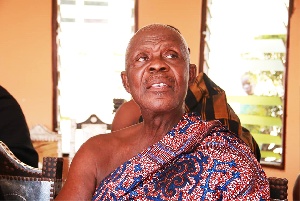“Kwahu Is Not at War – Let the War Drums Fall Silent” -Abene Krontihene Warns
In the cool, quiet hills of Kwahu Abene, there is no smoke rising, no sword drawn, and no war raging—only a call for calm, truth, and responsible journalism.
But according to the Kwahu Traditional Council, that peace is now under threat—not by weapons or warriors, but by words.
At a press conference held on the sacred grounds of the Kwahu Abene Palace on Monday, traditional leaders issued a powerful rebuke to certain media houses and broadcasters whom they accuse of peddling fear, fabricating chaos, and misleading the public on the state of affairs in the Kwahu Traditional Area.
“Kwahu is not in flames. Kwahu is not at war,” declared Nana Simpe Weredu, Krontihene of Kwahu Abene. “Let those beating the war drums silence themselves.”
False Reports, Real Harm
The chiefs pointed to a growing trend of sensational media narratives, especially surrounding chieftaincy matters in Kwahu. They cited, in particular, comments made by TV presenter Captain Smart during the 2025 Easter festivities on Onua Maakye, where he alleged that the area was gripped by violent clashes, with people being “butchered with machetes and dolma machines.”
“There was no such thing,” Nana Weredu insisted. “But his words carried weight—and people believed it. Fear spread, and our Easter economy suffered as visitors stayed away.”
Following the Easter incident, The New Republic and The Daily Graphic added fuel to the fire with alarming front-page headlines suggesting heightened tension and a deteriorating security situation in Kwahu. The New Republic’s story read:
“Kwahu Chieftaincy Tussle: Daasebre Akuamoah Agyapong II Reaffirmed… Tension Mounts in Kwahu.”
The Daily Graphic followed with:“Dispute Over Chieftaincy Stool: Tight Security in Kwahu.”
But according to the chiefs, the so-called “tight security” is fictional.
“Not a single police officer has been stationed at the palace in over seven months,” said Nana Asiedu Kwabeng IV, Akyeamehene of Kwahu Abene. “So where is the security clampdown? These are fabrications—and they are dangerous.”
Journalism at a Crossroads
The chiefs stopped short of attacking press freedom, but were firm in their call for responsibility, accuracy, and accountability in Ghanaian journalism.
“We are not calling for censorship. We are calling for truth,” one elder noted. “Ghanaian journalism has a proud tradition—let’s not trade it for cheap sensationalism.”
Their concerns are not hypothetical. They drew parallels to other countries where reckless media narratives sparked violence and instability—most notably Rwanda.
“Words can heal, but they can also ignite war. Let us not repeat the mistakes of history,” warned one senior chief.
A Call to Regulatory Bodies
The Kwahu Traditional Council is urging the National Media Commission (NMC) and the Ghana Journalists Association (GJA) to act swiftly. They are calling for investigations into the misleading stories, and sanctions for those who use journalism to stoke division.
At stake, they say, is not only Kwahu’s reputation—but Ghana’s broader social cohesion.
“This is not just a Kwahu matter. It is a national security issue,” Nana Simpe Weredu emphasized. “If the public cannot trust the news, fear takes root. And when fear rules, peace suffers.”
Kwahu Welcomes All – In Peace
Despite the tensions stirred by the media, the chiefs were unified in a single message to Ghanaians and the world: Kwahu remains peaceful, open, and ready to receive all who come in good faith.
“Our doors are open, our hearts are warm, and our land is safe,” they declared.
As they ended the press conference, their voices were clear and steady—an appeal not just to journalists, but to every citizen:
“Kwahu is not at war. Let the war drums fall silent.”

